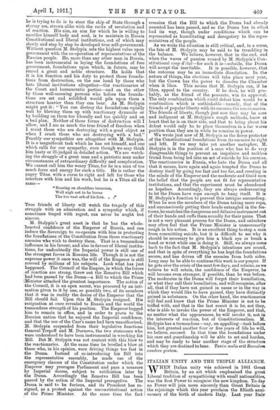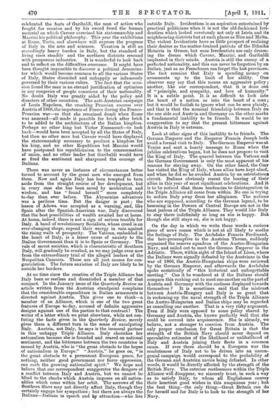ITALIAN UNITY AND THE TRIPLE ALLIANCE.
WHEN Italian unity was achieved in 1861 Great Britain, by an act which emphasised the great Liberal tradition of sympathising with small nationalities, was the first Power to recognise the new kingdom. To-day no Power will join more sincerely than Great Britain in the rejoicings which this year proclaim the fiftieth anni- versary of the birth of modern Italy. Last year Italy celebrated the feats of Garibaldi, the man of action who fought for reunion and by his sword freed the human material on which Cavour exercised his statesmanship and Mazzini his political philosophy. This year the exhibitions at Rome, Turin, and elsewhere will express the progress of Italy in the arts and sciences. Taxation is still an exceedingly heavy burden in Italy, but the standard of living rises steadily and the northern districts resound with prosperous industries. It is wonderful to look back and to reflect on the difficulties overcome. It might have been thought impossible to discover a political denomina- tor which would become common to all the various States of Italy, States disunited and unhappily or infamously governed by their various rulers. The fact that the occa- sion found the man is an eternal justification of optimism in any congeries of people conscious of their nationality. No doubt Italy was greatly aided by the policy and disasters of other countries. The anti-Austrian campaign of Louis Napoleon, the crushing Prussian success over Austria of 1866, the impotence of France during the Franco- Prussian war—so that she remained dumb when Rome was annexed—all made it possible for brick after brick to be added to the architecture of the Italian kingdom. Perhaps no other king but Victor Emmanuel—to look back—would have been accepted by all the States of Italy, but then no other man but Cavour would have displayed the statesmanship necessary to produce a kingdom for his king, and no other Republican but Mazzini would have postponed his republicanism to the consummation of union, and no other leader but Garibaldi would have so fired the sentiment and sharpened the courage of Italians.
There was never an instance of circumstances better turned to account by the great men who emerged from them. Now and again Italy has been tempted to turn aside from the straight course of her development, but in every case she has been saved by moderation and wisdom, and has " found herself " more completely to-day than ever before. The Abyssinian adventure was a perilous time. But the danger is past ' • the lesson of Adowa was accepted as a warning, and, like Spain after the Spanish-American war, Italy discovered that the best possibilities of wealth awaited her at home. At home, indeed, there is not a sign of serious trouble for Italy. A band of revolutionary Socialists, whose creed is an ever-changing shape, expend their energy in vain against the rising walls of prosperity. The Vatican, embedded in the heart of Italy, is a lesser cause of anxiety to the Italian Government than it is to Spain or Germany. The rule of secret societies, which is characteristic of Southern Italy, will gradually be crushed, as we may judge even now from the extraordinary trial of the alleged leaders of the Neapolitan Camorra. These are all just causes for con- gratulation. The future anxieties of Italy are likely to be outside her borders.
At no time since the creation of the Triple Alliance has Italy been so restless and dissatisfied a member of that compact. In the January issue of the Quarterly Review an article written from the Austrian standpoint complains that the considerable expenditure in Italian armaments is directed against Austria. This gives one to think—a member of an Alliance, which is one of the two great features of Europe to-day, accused of definite aggressive designs against one of the parties to that contract ! The writer of a letter which we print elsewhere, while not con- futing the facts given in the Quarterly Review, merely gives them a. different turn in the sense of exculpating Italy. Austria, not Italy, he says is the immoral partner in this unhappy Triple Alliance Italy cherishes her nationalism because she is founded and reared on national sentiment, and the bitterness between the two countries is caused by Austria, who is "the great obstacle to the hopes of nationalism in Europe." " Austria," he goes on, " is the great obstacle to a permanent European peace, for nothing, neither good government nor fierce oppression, can curb the growing nationalist spirit." We hope and believe that our correspondent exaggerates the dangers of a conflict between Italy and Austria, but we cannot be blind to the checks which Austria imposes on all nation- alities which come within her orbit. The sorrows of the Southern Slays may not directly affect Italy, though they certainly engage her sympathies ; but there are always the Italians—Italians in speech and by attraction—who live outside Italy. Irridentism is an aspiration entertained by practical politicians when it is not the old-fashioned Irri- dentism which looked covetously not only at Istria and its neighbouring districts but at such places as Nice and Malta. The violent Irridentists have as little prospect of realising their desires as the scatter-brained patriots of the Ethnike Hetairia in Greece, but sane Irredentists are only dream- ing the dream which Cavour, Mazzini, and Garibaldi implanted in their minds. Austria is still the enemy of a perfected nationality, and this can never be forgotten by an Italian, just as no Frenchman can forget the lost provinces. The fact remains that Italy is spending money on armaments up to the limit of her ability. One observer may say that this means an aggressive policy ; another, like our correspondent, that it is done out of " principle, and sympathy, and love of humanity." It is a subtle point. It is as difficult to look into the heart of a nation as into the heart of a man ; but it would be foolish to ignore what can be seen plainly, and that is that the nominal friendship between Italy on the one side and Austria and Germany on the other marks a fundamental inability to be friends. It would be no exaggeration to say that the present bitterness against Austria in Italy is extreme.
Look at other signs of this inability to be friends. The German Emperor and the Emperor Francis Joseph both avoid a formal visit to Italy. The German Emperor was at Venice and sent a hearty message to Rome when the jubilee celebrations began, but he does not propose to visit the King of Italy. The quarrel between the Vatican and the German Government is only the most apparent of his reasons for staying away. On the other hand, the Czar has visited the Bing of Italy, whose allies have kept aloof, and when he did so he avoided Austria by an ostentatious circuit. Italians obviously resent the bearing of their allies in this year of most significant celebrations. And it is to be noticed that these tendencies to disintegration in the Triple Alliance all come from within. No one is trying to seduce Italy away from her allegiance. The nations who are supposed, according to the German legend, to be hemming in the Powers of Central Europe are not in the least jealous of the Triple Alliance. They would like Italy to stay there indefinitely so long as she is happy. But though she still stays on, she is not happy.
On the day in which we write these words a curious piece of news comes which is not at all likely to soothe the feelings of Italy. The Archduke Francis Ferdinand, the heir-presumptive to the Austrian Throne, suddenly organised the reserve squadron of the Austro-Hungarian Navy, and sailed out to meet the German Emperor in the Adriatic. There, within sight of the Island of Lissa, where the Italians were signally defeated by the Austrians in the war of 1866, the Austro-Hungarian ships were reviewed by the German Emperor, and afterwards the Archduke spoke ecstatically of " this historical and unforgettable meeting." Can it be wondered at if the Italians should compare this rushing out to meet one another on the part of Austria and Germany with the coolness displayed towards themselves ? It is sometimes said that the mistrust between Austria-Hungary and Italy is so great that in reckoning up the naval strength of the Triple Alliance the Austro-Hungarian and Italian ships may be regarded as cancelling one another. That is a very risky argument. Even if Italy were opposed to some policy shared by Germany and Austria, she knows perfectly well that she could be coerced into acquiescence. She is already, we believe, not a stranger to coercion from Austria. The only proper conclusion for Great Britain is that the strength of the British Navy should never depend on speculative estimates of the likelihood or unlikelihood of Italy and Austria joining their fleets in a common cause. If ever there should be a European war the resoluteness of Italy not to be driven into an uncon- genial campaign would correspond to the probability of the German and Austrian navies being defeated. In other words, it would be directly affected by the strength of the British Navy. The extreme restlessness within the Triple Alliance will disappear, we sincerely trust, in such a way as to satisfy Italy, to whom all Englishmen convey their heartiest good wishes in this auspicious year ; but the best thing—the only thing—Great Britain can do for herself and for Italy is to look to the strength of hex Navy.











































 Previous page
Previous page